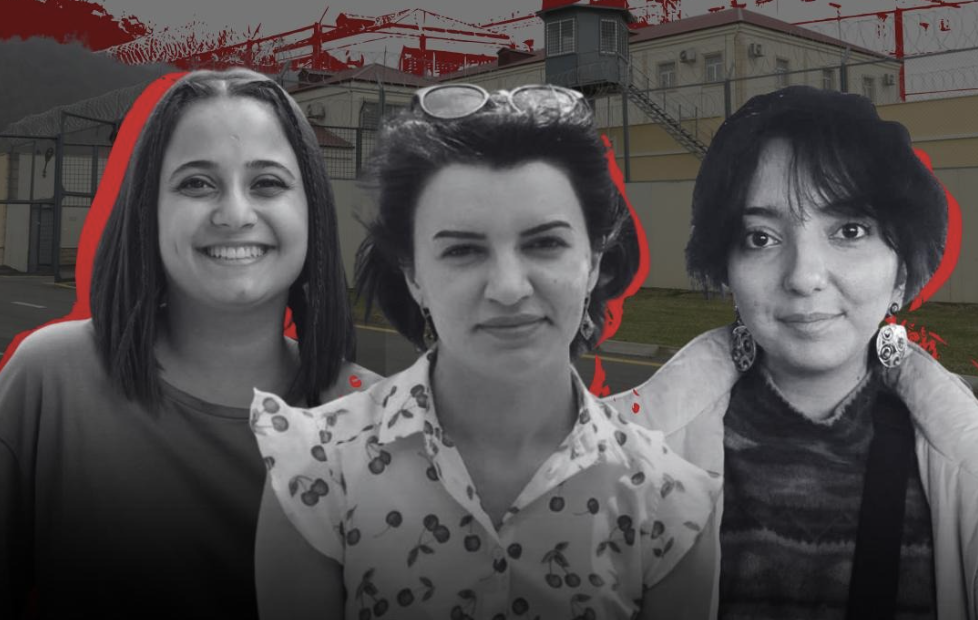Elnarə Qasımova, a reporter of "Abzas Media" currently held in detention, has addressed a letter to the public from Baku Detention Center No. 1. In her letter, the journalist detailed the injustices, physical and psychological abuse, and inhumane treatment faced by female prisoners in the facility.
We present the text as it is:
"The management system of Baku Detention Center No. 1 (BDC) has many similarities with the governance style of Azerbaijan. Just as the rights of citizens are violated in the country, the rights of those held in the BDC are trampled upon. Legally deprived of their freedom, these individuals also face unlawful deprivations within the facility. In this detention center, which in many ways makes one forget that we are in the 21st century, poor conditions and rights violations prevail. As the facility’s director, Elnur Ismayilov, himself admits, the place is run by unwritten laws.
So, which of the inmates' rights, as outlined in written laws, are being violated? I will note a few of them.
Article 4, Clause 3 of the Law ‘On Ensuring the Rights and Freedoms of Persons Held in Detention Facilities’ states: ‘The operation of detention facilities is financed by the state budget of the Republic of Azerbaijan.’ This implies that the poor conditions, coupled with human rights violations faced by detainees, cannot be justified by budgetary constraints. The lack of provisions intended for detainees is not their issue but a responsibility that falls squarely on the facility's administration to resolve.
The issues highlighted in a previous report published by Abzas Media remain unresolved. Female detainees are still not provided with the goods and supplies they are entitled to. It seems that Elnur Ismayilov, who sends blank A4 sheets alongside congratulatory letters to female inmates during holidays, is not particularly concerned about the fate of these detainees in the institutions he oversees.
Article 15.1.3 - Clause 1.3 of Article 15 of this law stipulates one of the rights of detainees: ‘After admission to detention facilities and during their detention, detainees have the right to be informed in writing, in a language they understand, about their rights, obligations, internal disciplinary rules, including the regime of detention facilities, and the procedure for submitting proposals, applications, and complaints. They also have the right to retain this written information.’
This right is also being violated in the Detention Facility. Neither I nor the other female inmates I am in contact with have been provided with the information mentioned in this clause, including ‘The Internal Disciplinary Rules’.
On November 14, 2024, I was accused of violating internal rules that I had never been informed about. During a discussion about this, I requested a copy of the rules from Deputy Ahad Abdiyev but achieved no positive outcome. In the following days, the deputy mentioned that he could only provide the section of the rules applicable to inmates—likely to prevent us from witnessing any additional violations by staff. Apparently, these rules are deemed ‘unfit’ for inmates.
Article 15.1.22 - Detained individuals have the right to receive free assistance as stipulated by the ‘Law on Psychological Assistance.’
In the early days of my arrival at the Baku Detention Facility No. 1 (BIT), I was introduced to psychologist Tarana Guliyeva, who inquired about any psychological distress I might have and assured me I could approach her if needed. However, observing her behavior in the following days—such as searching us before meetings with lawyers or court appearances and hearing her shout at other female inmates in the corridor—I concluded she was not someone I could turn to for psychological help. Moreover, the psychologist’s office seems to serve purposes beyond psychological services. It has become a venue for actions like women being threatened by staff, extortion of money from them, and other similar issues.
Article 19.7 - According to Clause 7 of Article 19 of this law, detained individuals have the right to make phone calls twice a week, each lasting up to 15 minutes.
However, based on what I have observed while waiting in line to use the phone, as well as accounts from other women, the majority of female inmates are only allowed to speak for 10 minutes. At the 10-minute mark, they are forced to end their calls under pressure from the staff. Despite this, staff members often sign the phone log on behalf of the inmates, falsely recording the call duration as 15 minutes. Additionally, the table where the phones are placed is uncomfortably close to the guards' desks. Female inmates are forced to sit in close proximity to the guards while making their calls. Proper phone booths, situated at a reasonable distance from the staff's desks, should be provided for such conversations. Moreover, guards openly pick up the receiver during calls and listen in on conversations without any attempt to hide their actions. If proper monitoring were conducted, it would likely reveal that calls to hotlines like the Prosecutor General’s Office, Ombudsman, and other institutions are extremely rare from the women’s section of the detention center. This is often because the staff blocks such calls as soon as they become aware of them. For instance, I have personally witnessed a woman’s call to the Prosecutor’s Office hotline being disconnected the moment staff discovered its nature. Phone calls with lawyers are absolutely not subject to prohibition under any circumstances. However, this unlawful restriction is still being imposed on us under the direct orders of the facility's head, Elnur Ismayilov.
Article 28: Ethical Behavior - According to this law, ‘Staff at detention facilities must treat detained or imprisoned individuals with respect. It is prohibited to engage in degrading actions or mistreatment toward detainees or prisoners.’
However, female prisoners are often subjected to discrimination. Many staff members communicate with them in a rude or demeaning manner. At times, inmates face psychological or physical violence, yet the staff members responsible for these actions are not held accountable and continue their work. For example, Adalat Qurbanov, who was considered a threat by female prisoners, returned to his position in the women’s section after November 14, despite the fact that previously Adalat Gurbanov had beaten a female prisoner.
In addition, the employees of the Baku Investigative Detention Center (BİT) use sticks and handcuffs more as a means of intimidation rather than to prevent the situations specified in the law (Article 45.2.1 and Article 45.2.2). Their ‘justification’ is that ‘the stick was not given to the employees just like that.’
These are just a few of the rights violations that women held in the Baku Investigative Detention Center (BİT) face. When they protest the violations of their rights, they often hear this response from detention center staff: "Did I ask you to commit a crime and get arrested?" This statement constitutes another violation of rights. Those held in detention are individuals whose appeal processes have not yet been concluded. Until a court decision is finalized, no one can be called a criminal. This is a violation of the presumption of innocence. However, this violation does not concern detention center staff. They believe that because individuals are held in a closed facility, they can treat them as they wish. The absence of accountability gives them a sense of certainty.
When Minister of Justice Farid Ahmadov visited the detention facility this year, he did not visit the women's section. The guards, meanwhile, reprimanded the women for knocking on the doors. Even if the doors were knocked, the minister had already taken a route far enough not to hear the sounds.
Elnara Gasımova, Baku Investigation Detention Center.”

 Foto: Amerikanın Səsi
Foto: Amerikanın Səsi





